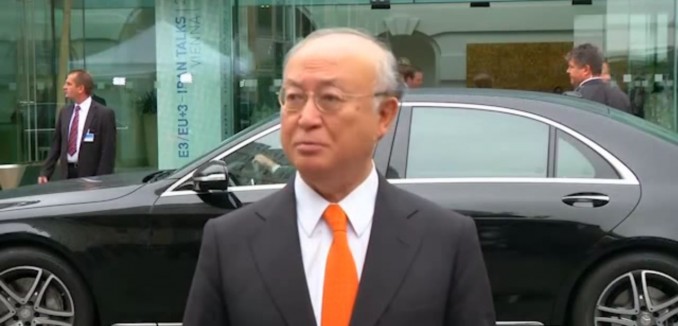The Joint Comprehensive Plan of Action (JCPOA), the international agreement signed by Iran and the West, will give the Islamic Republic up to 24 days to hide any illicit nuclear activity from international inspectors.
Under the terms of the deal, the only site Iran may use for nuclear development for the next 15 years will be the Natanz facility. The International Atomic Energy Agency (IAEA), the UN’s nuclear watchdog organization, will be charged with ensuring that Iran fulfills this obligation. But under the framework agreement, while the IAEA will be able to monitor Iran’s existing reactors at Arak, they will not have unfettered access to other sites that might potentially contain nuclear development activities.
Iran has a history of covering up illicit nuclear developments. In August of 2002, an Iranian dissident group “revealed a secret uranium enrichment facility at Natanz and a heavy water facility at Arak,” the United States Institute of Peace noted. Following the incident:
The U.N. nuclear watchdog agency determined that for the previous 18 years, Iran had secretly developed technologies to produce highly enriched uranium. The IAEA reported that Iran had failed to declare several of its nuclear-related activities as required by the 1970 Nuclear Non-Proliferation Treaty.
In May of 2013, Iranian president Hassan Rouhani bragged on Iran’s state IRIB TV that “only the illiterate” would believe “the lie” that “everything was suspended” on the nuclear program when Rouhani served as the chief negotiator from 2003-2005.
As reported by The Times of Israel:
He proceeded to detail how Iran, in fact, had flagrantly breached the October 2003 “Tehran Declaration,” which he said “was supposed to outline how everything should be suspended.” Although Iran issued a joint statement with visiting EU ministers in October 2003 setting out its pledged obligations under the Tehran Declaration, in practice, Rouhani said in the interview, “We did not let that happen!”
If the IAEA suspects “undeclared nuclear materials or activities,” it will have to “provide Iran the basis for such concerns and request clarification.” If Iran does not sufficiently address the concerns, the IAEA may request access to the sites from Iran. Iran then has the option of proposing “alternative means of resolving the IAEA’s concerns” at the location in question, which the plan stipulates must be given “due and prompt consideration.”
76. If Iran’s explanations do not resolve the IAEA’s concerns, the Agency may request access to such locations for the sole reason to verify the absence of undeclared nuclear materials and activities or activities inconsistent with the JCPOA at such locations. The IAEA will provide Iran the reasons for access in writing and will make available relevant information.
77. Iran may propose to the IAEA alternative means of resolving the IAEA’s concerns that enable the IAEA to verify the absence of undeclared nuclear materials and activities or activities inconsistent with the JCPOA at the location in question, which should be given due and prompt consideration.
Iran has 14 days after the IAEA’s initial request to resolve the concerns “through necessary means agreed between Iran and the IAEA.” If no agreement is reached after two weeks, the Joint Commission—a body tasked with overseeing the implementation of the deal, staffed by members of the signatory nations, including Iran itself—has 7 days to advise “on the necessary means to resolve the IAEA’s concerns.” Iran then will have three additional days to implement the “necessary means” to resolve the issue.
- If the absence of undeclared nuclear materials and activities or activities inconsistent with the JCPOA cannot be verified after the implementation of the alternative arrangements agreed by Iran and the IAEA, or if the two sides are unable to reach satisfactory arrangements to verify the absence of undeclared nuclear materials and activities or activities inconsistent with the JCPOA at the specified locations within 14 days of the IAEA’s original request for access, Iran, in consultation with the members of the Joint Commission, would resolve the IAEA’s concerns through necessary means agreed between Iran and the IAEA. In the absence of an agreement, the members of the Joint Commission, by consensus or by a vote of 5 or more of its 8 members, would advise on the necessary means to resolve the IAEA’s concerns. The process of consultation with, and any action by, the members of the Joint Commission would not exceed 7 days, and Iran would implement the necessary means within 3 additional days.
A bipartisan group of American diplomats, legislators, policymakers, and experts convened by the Washington Institute for Near East Policy signed a public statement three weeks ago outlining five key requirements for a good deal, the very first of which was monitoring and verification.
- Monitoring and Verification: The inspectors of the International Atomic Energy Agency (the “IAEA”) charged with monitoring compliance with the agreement must have timely and effective access to any sites in Iran they need to visit in order to verify Iran’s compliance with the agreement. This must include military (including IRGC) and other sensitive facilities. Iran must not be able to deny or delay timely access to any site anywhere in the country that the inspectors need to visit in order to carry out their responsibilities.
The group, which included former Obama administration advisers such as former National Security Council senior director Dennis Ross, former arms control coordinator Gary Samore, as well as former IAEA deputy director Olli Heinonen, added that “Without these features, many of us will find it difficult to support a nuclear agreement with Iran.”
French Foreign Minister Laurent Fabius cautioned in May that “in 24 days, a lot of things can disappear…there has to be concrete commitments on the enrichment activities allowed for length of the accord, including a phased reduction in the number of centrifuges at the underground site of Fordow and an efficient mechanism to restore sanctions if Iran does not respect its commitments.”
[Photo: IBTimes UK / YouTube]




